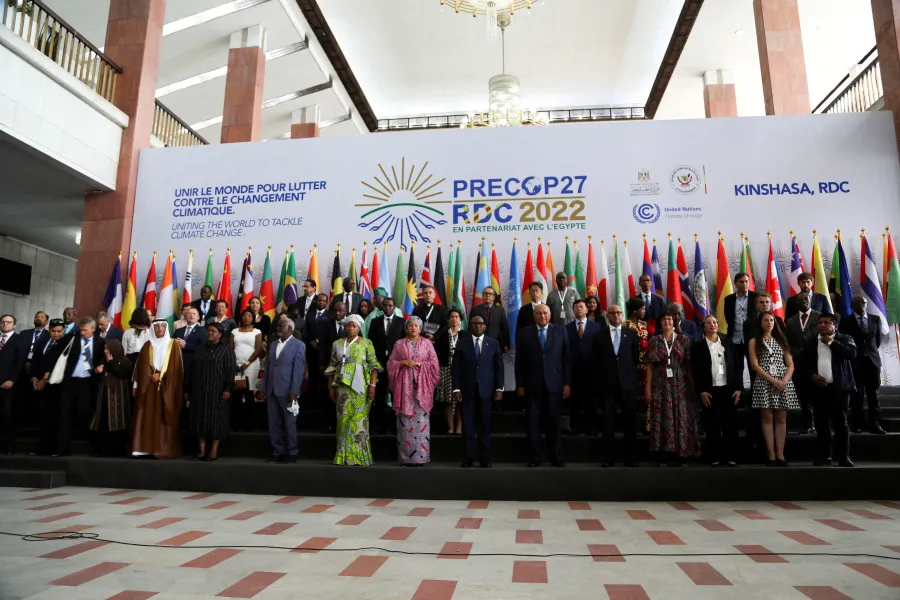
International climate change conferences are a weighty enterprise—one that needs to be held up by solid pillars of action, not just warm words and hot air.
The upcoming United Nations climate event in Egypt in November, COP27, will be no different. It will only hold up if supported by key pillars, but none is more robust for Africa than international climate finance.
This year’s meeting of world leaders has been christened the ‘Africa COP,’ not because the continent is playing host, but because Africa is increasingly taking the biggest hits from the effects of climate change. Yet, it has contributed the least to the climate crisis.
Africa emits only around 3% of global carbon dioxide emissions — responsible for stoking climate change — but shoulders an oversized burden of the effects.
Besides having a smaller carbon footprint, Africa also absorbs global emissions, through ‘carbon sinks’ such as the Congo Basin — the world’s second largest tropical rainforest after the Amazon.
The continent is highly dependent on climate-vulnerable operations (such as agriculture, hydropower production, tourism and wildlife) exposing it to climate disruptions including worsening droughts and floods, as well as environmental degradation.
Previous pledges by developed countries, the biggest carbon emitters, to channel $100 billion a year by 2020 towards helping vulnerable nations adapt to climate change have gone unfulfilled.
Africa alone faces a climate financing gap of about $108 billion each year, according to the African Development Bank, amid growing economic shocks from the Covid-19 pandemic and the war in Ukraine.
This week, ministers converged in Kinshasa for the Pre-COP meeting to lay the groundwork ahead of the November COP27 summit. The meeting came hot on the heels of the just concluded UN General Assembly (UNGA) in New York, where the issue of climate action featured prominently.
The COP27 conference should, therefore, rest on the pillar of climate finance, among other strategic areas. And this time, rich nations should be legally bound to follow through on their pledges.
This shouldn’t be viewed as a favour from the polluters; it’s what they owe the rest of the population.
International climate finance takes three forms: mitigation finance, adaptation finance and loss and damage finance.
Mitigation finance could be used to invest in, for instance, renewable energy, clean cooking projects or electric transportation to help lower emissions.
Adaptation financing, on the other hand, would be for projects such as sinking boreholes to cushion communities from drought, or constructing gabions to protect villages from floods.
Loss and damage finance, also known as climate reparations, refers to money some governments and civil society groups say must be made available to poorer countries to help them cope with the devastating impacts of climate change.
That is things like cash availed to rebuild villages lost to floods or farms turned to desert by rising temperatures.
Unfortunately, at last year’s climate conference, COP26 in Glasgow, climate finance was a muted issue, not because it was never raised but because rich economies like the United States and the European Union conveniently turned a blind eye to it.
To this end, COP27 should set out to establish a financing facility for addressing loss and damage, and swiftly take steps to operationalise it. Further, consensus is needed in making loss and damage finance grant-based to avoid piling a debt burden on African countries.
There are reasons to be hopeful.
There is a growing appetite among both private and public institutions, alongside financial institutions, for financing and investing in climate projects in Africa. Big-ticket green projects have been built in recent years, with many more taking shape.
In East Africa, Kenya has gone big on geothermal development and recently set up the 310 megawatt (MW) Lake Turkana Wind Power, which helped offset 0.7 million tonnes of carbon emissions in its first year of operation.
In the north, Morocco recently started operating the first phase of Noor II, a mega solar project with a capacity in excess of 300MW.
Challenges remain, however.
Increased funding and investments are still hampered by negative perception of risk among investors, underdeveloped green finance markets, as well as local technical and policy constraints.
Also, global climate finance is currently structured against climate-vulnerable countries. The more vulnerable a country is, the less climate finance they’re likely to receive from global funds such as the Green Climate Fund.
Finally, a sustainable switch to a green global economy would be one that creates new jobs while at the same time offering fallback options to those whose jobs have disappeared during the transition.
We urgently need to scale up climate finance, to help those urgently in need now and also build a better tomorrow.










